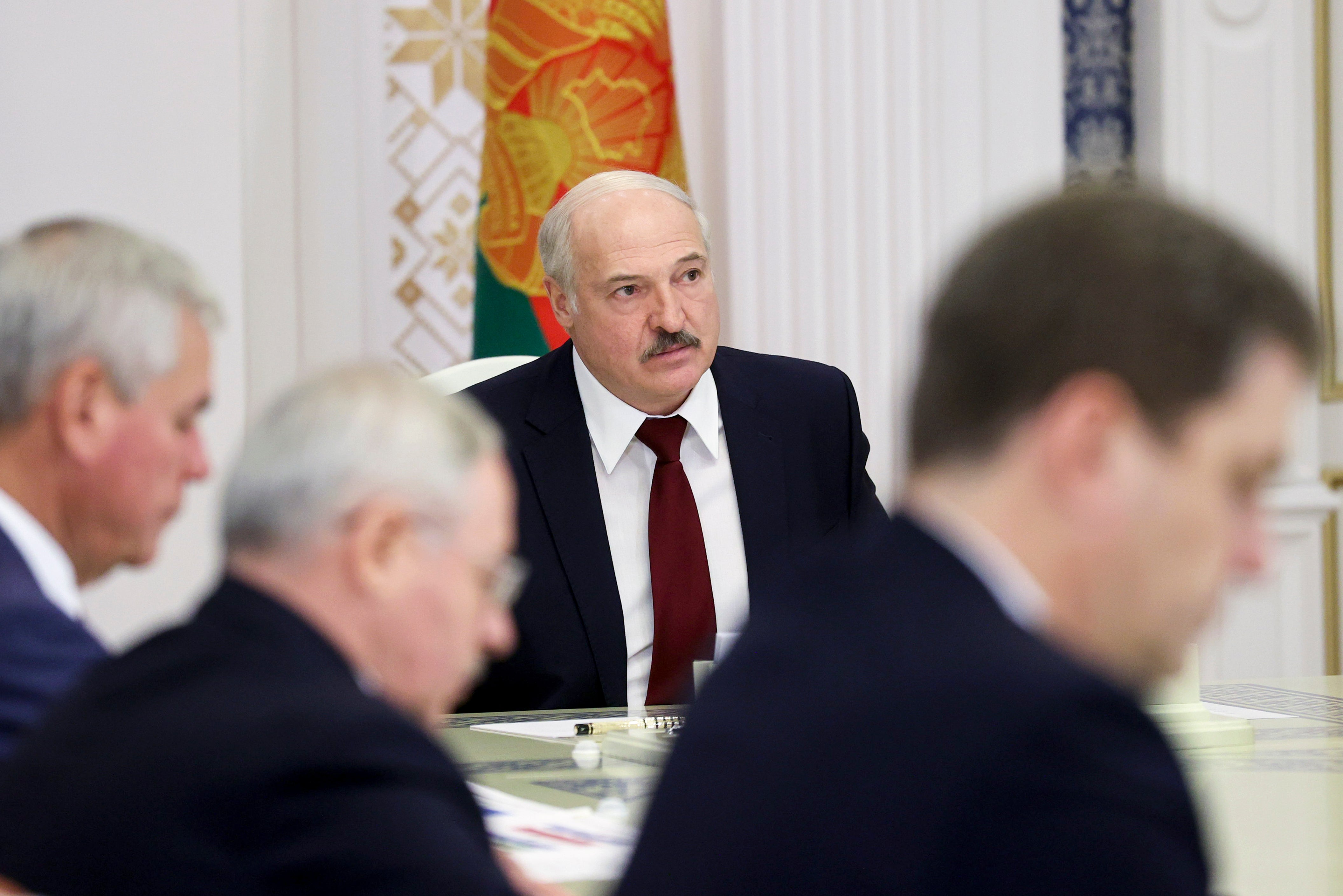Belarus leader seeks to punish striking workers, students
Belarus President Alexander Lukashenko is urging officials to take action against plant workers and students who participate in a strike called by the opposition to protest his remaining in power

Your support helps us to tell the story
From reproductive rights to climate change to Big Tech, The Independent is on the ground when the story is developing. Whether it's investigating the financials of Elon Musk's pro-Trump PAC or producing our latest documentary, 'The A Word', which shines a light on the American women fighting for reproductive rights, we know how important it is to parse out the facts from the messaging.
At such a critical moment in US history, we need reporters on the ground. Your donation allows us to keep sending journalists to speak to both sides of the story.
The Independent is trusted by Americans across the entire political spectrum. And unlike many other quality news outlets, we choose not to lock Americans out of our reporting and analysis with paywalls. We believe quality journalism should be available to everyone, paid for by those who can afford it.
Your support makes all the difference.Belarus President Alexander Lukashenko urged authorities Tuesday to take action against plant workers and students who participate in a strike called by the opposition as the authoritarian leader made another attempt to halt protests of his reelection.
University students left classes to march in rallies and some factory employees went on strike Monday after Lukashenko ignored an opposition demand to resign following the balloting that was widely viewed as rigged. Nearly 600 people were detained in the capital of Minsk and other cities.
Lukashenko told government officials that “those came out to unauthorized rallies in violation of the law should be deprived of the right to be a student,” adding that factory workers who want to continue working should be “freed” from those who are on strike.
“No need to persuade anyone: neither workers, nor students, doctors, teachers, officials,” Lukashenko said. “Now is the moment when everyone should choose the road in their life they would be taking."
Belarus has been rocked by the largest and most sustained protests in Lukashenko's 26-year rule. The rallies began after the Aug. 9 election, which officials said gave him a landslide victory over his widely popular challenger, Sviatlana Tsikhanouskaya
She and her supporters refused to recognize the results, saying the vote was riddled with fraud. Since then, thousands have taken to the streets regularly, demanding Lukashenko step down.
Lukashenko, who has suppressed dissent during more than a quarter-century in power, scoffed at suggestions of a dialogue with the opposition. Instead, the authorities have used stun grenades, tear gas, water cannons and rubber bullets to break up the rallies, and they have detained demonstrators and arrested activists. Nevertheless, the protests continued.
On Tuesday Lukashenko charged that “a terrorist war” is being waged against the government “on some fronts,” accusing the largely peaceful protesters of “radicalizing.”
Tsikhanouskaya, who fled to Lithuania for fear of her safety, had urged the nationwide strike if Lukashenko did not resign, release political prisoners and stop the police crackdown. She gave the go-ahead Sunday night for the strike to begin after police in Minsk and other cities once again dispersed demonstrators with stun grenades and tear gas.
Sunday’s rally in Minsk was one of the largest in weeks and drew nearly 200,000 people.
The strike on Monday failed to spread wide enough to halt major state-run plants and factories that make up the core of the Belarus economy. Some factory workers walked off the job, thousands of students and retirees marched in Minsk, and some small business owners closed, but most state enterprises continued to operate as usual.
“The opposition managed to create separate strike hot spots — at some (plants entire) divisions are not operating; at others, separate workers are on strike. But the authorities succeeded in intimidating and quashing the protest at plants,” said Alexander Yaroshuk, leader of the Belarusian Congress of Democratic Unions, an association of independent labor unions.
Police detained 581 protesters and strikers Monday across the country. Detentions continued Tuesday, as dozens of human chains sprung up again in Minsk, and students continued their rallies, joined by their professors. The Viasna human rights group said over 30 people were detained in Minsk, Grodno, Polotsk and Smolevichi.
Engineer Alexander Lavrinovich, a strike leader at the Minsk Wheeled Tow Truck Plant, was fired Tuesday, Yaroshuk said.
Workers who refused to start their shift Tuesday at Grodno Azot, a major producer of nitrogen fertilizer in the western city of Grodno, said security officers showed up at their doors.
Tsikhanouskaya urged Belarusians to support the striking workers, saying they have to resist pressure from the authorities.
“If we help plants to strike, they will help us finish what we started. The regime is afraid of this force and responds to it," she said. “During one of the calls with strike leaders, they told me an important thing: ‘Solidarity is our best insurance from defeat.’”